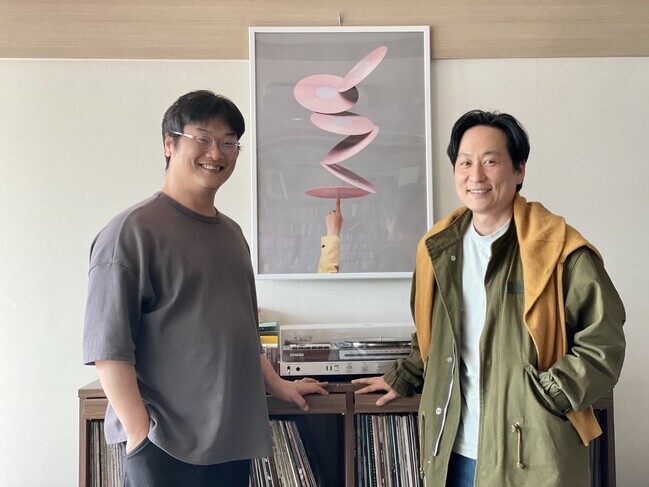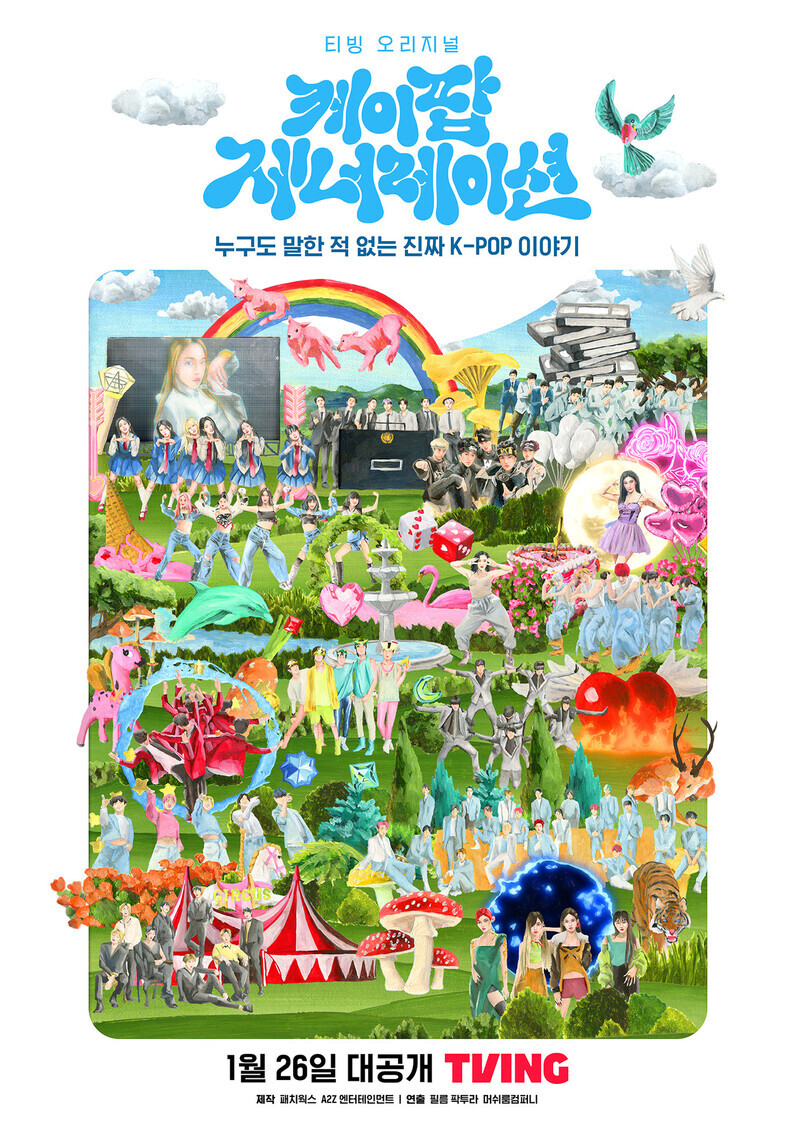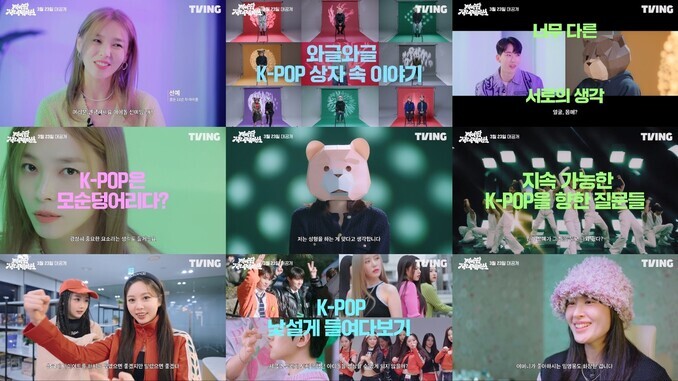hankyoreh
Links to other country sites 다른 나라 사이트 링크
New documentary series pushes back against stereotypes of K-pop industry by digging deep

K-pop is a hot commodity on global streaming services. So far, Netflix has released the 2020 documentary “Blackpink: Light Up the Sky,” while Disney+ has been showing BTS content since last year. The common focus is on stars with a robust global fan base.
But now, one service is drawing attention with a recent documentary that offers a more three-dimensional look inside the K-pop industry itself.
The show is “K-Pop Generation,” the eighth and final episode of which went up on Tving last Thursday. As the subtitle suggests, the aim is to share the “true K-pop stories that no one has shared before.”
Meeting the Hankyoreh at his studio in Seoul’s Seongsu neighborhood on April 3, critic Cha Woo-jin said, “While other K-pop documentaries have had their own significance and achievements, they didn’t quite seem to reach deep enough.”
“When it comes to K-pop, the music, the industry, the artists, and the fans are all connected. I wanted to take more of a 360-degree, three-dimensional look at that,” he explained. Cha served as a producer overseeing the documentary’s story.
Executive producer Im Hong-jae said, “Most of the past documentaries have been artist-centered, providing more of a diachronic glimpse at how popular K-pop is overseas.”
“They might start with Seo Taiji and Boys or H.O.T. before finishing up with scenes showing Westerners going crazy for BTS. We want to take a step outside of that,” he added.
A producer whose varied resume includes the competitive cooking program “MasterChef Korea” and the web drama “I’m Not a Robot,” Im set up his own documentary production company before taking part in the project.

The first episode, which premiered on Jan. 26, was titled “Geeking Out.” It focuses on offering a front-and-center look at K-pop fans in their own voices.
Cha explained that “fan bases are mentioned as the most important thing in the K-pop industry, but they’ve also been the most neglected.”
“We wanted to give an unvarnished look at different kinds of fans, shattering the old stereotypes about ‘fangirls,’” he added.
Im talked about how difficult it was getting fans to take part.
“There was a lot of distrust toward the media. Even when they agreed to appear, they asked to be anonymous and to have their faces obscured,” he said.
“As I was wrestling with the question of how to put this online with the faces covered up, I came to understand something particular about the K-pop fan base,” he continued.
“In terms of identity, the fans are like ‘alter ego characters.’ The fans would feel more comfortable and share things in greater depth when we respected that.”
Another noteworthy aspect of the documentary series is the way it highlights the creators quietly supporting things behind the stage. The second episode looks at the people who make K-pop, while the seventh focuses on performances as a central element of the genre. They show the struggles and intense pressures faced by producers, choreographers, music video directors, and stylists.
Posting footage from her appearance on social media, Kim Bo-na — who oversees styling for Hwasa, a member of the group Mamamoo — explained, “In my interview, I thought about the work I do and how difficult it still is, how I’ve spent so many sleepless nights and wrestled with so many things, and why I can’t quit even when it leaves me exhausted.”

“I gained a newfound realization of the many people besides us who are working hard in different areas, and I came away with a real sense of responsibility,” she said of the program.
Im said, “K-pop is often criticized for being like a ‘factory stamping out [musical acts],’ but when you actually meet the producers, they’re all working very hard, wrestling with real questions and experimenting with different things.”
Candid stories are also shared by many members of the first through fourth generations of K-pop acts, including Kangta (from H.O.T.), BoA, Sunmi (from Wonder Girls), Suho (from Exo), Doyoung (from NCT), Tomorrow X Together, and Ive.
Im explained, “The artists aren’t just passive entities doing what they’re told; they’re proactive agents.”
“It’s the same whether you’re talking about a veteran like Sunmi or one of the newcomers,” he stressed.

After a recent M&A battle between Hybe and Kakao over SM Entertainment, Kakao ended up joining forces with SM. What are Cha’s thoughts on this?
“SM and Hybe aren’t the same kind of K-pop company. The Hybe group is more along the lines of an investment company with different labels, while SM is a label,” he said.
“Hybe is going to follow the model of the global record companies like Universal, Sony, and Warner,” he predicted. “SM has also said it wants to go in that direction now, which is what ‘SM 3.0’ is.”
“We’re going to be seeing huge changes going forward. Hybe is going to acquire and manage US labels, and SM is going to work to acquire US and Latin American labels,” he continued. “As the company in charge of SM, Kakao Entertainment could get listed in the US.
What does this mean for K-pop’s future?
The documentary’s eighth episode “Next Generation” imagines the future that awaits K-pop. This includes everything from the new generation’s thoughts about K-pop to the expansions of intellectual property rights through new technologies such as the metaverse and virtual humans, along with the politics and sociology of K-pop in connection with things like environmental issues.
K-pop fans are shown planting trees and grappling with the issue of overconsumption of plastic-based records in an effort to protect the environment. Young people at a 2020 democratization demonstration in Thailand are shown dancing and singing along to the Girls’ Generation song “Into the New World,” just like Ewha Womans University students in 2016. The images illustrate how K-pop is evolving into new ways of living.
“I see K-pop as the culture of the next generation,” Cha said.
“In a sense, the future of K-pop also hinges on the next generation.”
By Suh Jung-min, staff reporter
Please direct questions or comments to [english@hani.co.kr]

Editorial・opinion
![[Guest essay] Preventing Korean Peninsula from becoming front line of new cold war [Guest essay] Preventing Korean Peninsula from becoming front line of new cold war](https://flexible.img.hani.co.kr/flexible/normal/500/300/imgdb/original/2024/0507/7217150679227807.jpg) [Guest essay] Preventing Korean Peninsula from becoming front line of new cold war
[Guest essay] Preventing Korean Peninsula from becoming front line of new cold war![[Column] The state is back — but is it in business? [Column] The state is back — but is it in business?](https://flexible.img.hani.co.kr/flexible/normal/500/300/imgdb/original/2024/0506/8217149564092725.jpg) [Column] The state is back — but is it in business?
[Column] The state is back — but is it in business?- [Column] Life on our Trisolaris
- [Editorial] Penalties for airing allegations against Korea’s first lady endanger free press
- [Editorial] Yoon must halt procurement of SM-3 interceptor missiles
- [Guest essay] Maybe Korea’s rapid population decline is an opportunity, not a crisis
- [Column] Can Yoon steer diplomacy with Russia, China back on track?
- [Column] Season 2 of special prosecutor probe may be coming to Korea soon
- [Column] Park Geun-hye déjà vu in Yoon Suk-yeol
- [Editorial] New weight of N. Korea’s nuclear threats makes dialogue all the more urgent
Most viewed articles
- 1Behind-the-times gender change regulations leave trans Koreans in the lurch
- 2South Korean ambassador attends Putin’s inauguration as US and others boycott
- 3Yoon’s revival of civil affairs senior secretary criticized as shield against judicial scrutiny
- 4Family that exposed military cover-up of loved one’s death reflect on Marine’s death
- 5AI is catching up with humans at a ‘shocking’ rate
- 6[Guest essay] Preventing Korean Peninsula from becoming front line of new cold war
- 7Yoon’s broken-compass diplomacy is steering Korea into serving US, Japanese interests
- 8Japan says its directives were aimed at increasing Line’s security, not pushing Naver buyout
- 91 in 10 marriages in Korea last year was with a foreign national
- 10[Editorial] New weight of N. Korea’s nuclear threats makes dialogue all the more urgent